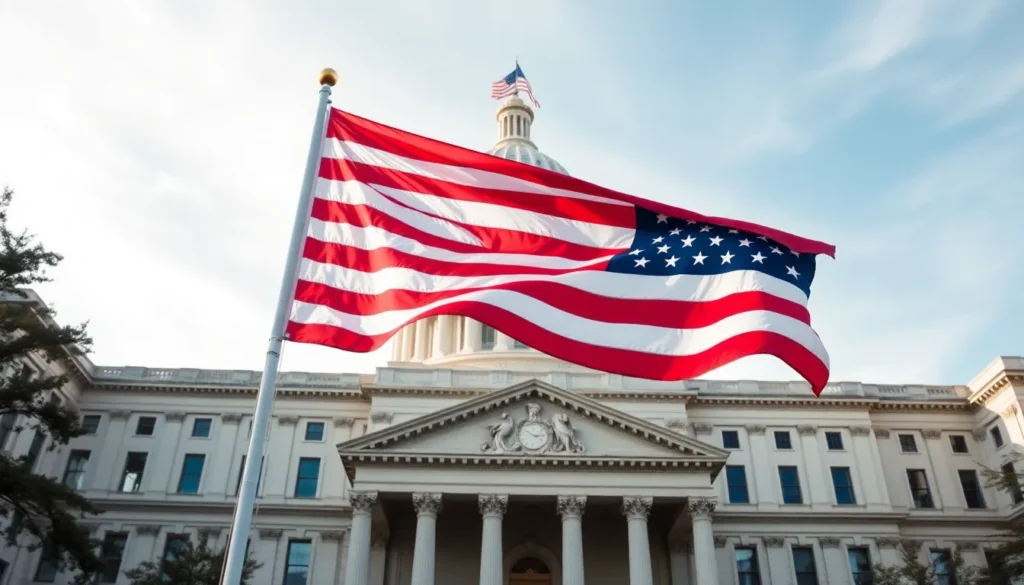Table of Contents
TogglePresidents Day is more than just a long weekend; it’s a time when many Americans reflect on the legacy of the nation’s leaders. But for investors and traders, this holiday raises an important question: is the market closed on Presidents Day? Understanding the market’s schedule is crucial for anyone looking to make informed decisions about their investments.
On this federal holiday, most financial markets, including the stock market, typically observe a closure. This means that traders should plan accordingly, as they won’t be able to execute trades or access their accounts. Knowing the market’s hours can help avoid confusion and ensure that investment strategies remain on track. As Presidents Day approaches, it’s essential to stay informed about market operations to navigate your financial goals effectively.
Overview of Presidents Day
Presidents Day, observed on the third Monday in February, honors all U.S. presidents, particularly George Washington and Abraham Lincoln. The holiday’s establishment as a federal holiday in 1971 aimed to create a long weekend for federal employees. Many states recognize this day as a time for patriotic celebrations and historical reflection.
Financial markets, including the New York Stock Exchange and NASDAQ, typically close on Presidents Day. This closure provides investors and traders with an opportunity to pause and reflect on their investment strategies. Since financial institutions operate differently during this holiday, understanding the market’s status aids in planning trades and investment decisions.
Educational institutions and various businesses may also close or alter their hours significantly on Presidents Day. Awareness of these changes benefits individuals planning activities or financial transactions during this time.
Market Holidays in the United States

Market holidays play an essential role in the trading calendar, especially for investors and traders. Understanding these holidays helps individuals plan their financial activities effectively.
Federal Holidays
Federal holidays represent designated days when federal government offices close, impacting various sectors. In the United States, there are eleven federal holidays, including New Year’s Day, Independence Day, and Memorial Day. On these holidays, federal employees receive paid time off, and most businesses, schools, and financial markets also close or adjust their schedules. Presidents Day, observed on the third Monday in February, stands out as a day for the nation to honor past leaders while halting economic activities in many sectors.
Stock Market Schedule
The stock market follows a specific schedule regarding operational days. The New York Stock Exchange (NYSE) and NASDAQ close on all federal holidays, including Presidents Day. Trading on these exchanges typically runs from 9:30 AM to 4:00 PM ET on regular days. In addition to federal holidays, the markets also close for special events, such as Christmas and Thanksgiving. It’s important for investors to be aware of these closures to manage trading decisions, strategize around holidays, and avoid surprises in their investment timelines.
Is the Market Closed on Presidents Day?
Most financial markets, including the stock market, remain closed on Presidents Day, affecting trading activities for investors and traders alike.
Historical Context
Presidents Day originated as a celebration of George Washington’s birthday, falling on February 22. The holiday was officially established in 1971, making it a federal holiday observed on the third Monday of February. Over time, Presidents Day evolved to honor all U.S. presidents, particularly Abraham Lincoln. This transformation reflects a broader appreciation of American leadership. The stock market’s closure aligns with federal observance, emphasizing its importance in American culture.
Impact on Investors
Market closures on Presidents Day affect trading schedules and investment decisions. Investors cannot conduct trades or react to market changes on this holiday. This break offers a moment for investors to evaluate their portfolios and strategies. Financial planning becomes crucial, especially around holidays, as not all institutions observe the same hours. Therefore, investors should verify market schedules and adjust their timelines accordingly to avoid unexpected disruptions in trading activities.
Alternatives for Investors on Presidents Day
Investors seeking alternatives on Presidents Day can explore several options to maintain engagement with their financial plans despite the market closure.
- Research Investments: Investors can conduct thorough research on potential stocks, mutual funds, or exchange-traded funds (ETFs). Evaluating historical performance and analyzing market trends can provide insights that enhance future investment decisions.
- Review Portfolios: Reviewing existing portfolios allows investors to assess asset allocation, diversification, and risk exposure. This process aids in identifying underperforming assets or opportunities for rebalancing.
- Educate Themselves: Engaging in financial education through online courses, webinars, or reading investment books offers a valuable way to enhance knowledge. Increased understanding can lead to more informed decision-making in future market activities.
- Plan Future Trades: Investors can draft strategies for upcoming market days. Developing trading plans based on research and analysis can facilitate timely execution once the market reopens.
- Participate in Financial Forums: Joining investment forums or discussion groups enables investors to share insights and strategies with peers. It fosters a collaborative environment where they can gather diverse perspectives on market conditions.
- Monitor Economic Indicators: Tracking economic reports scheduled for release after Presidents Day helps investors prepare for potential market movements. Key data such as employment figures or GDP growth can significantly influence market sentiment.
- Consider Alternative Markets: Exploring international markets or cryptocurrencies might provide trading opportunities, as these can operate independently of U.S. holidays. Investors should be cautious and conduct due diligence before participating.
- Engage with Financial Advisors: Consulting with financial advisors allows investors to discuss personal goals, reevaluate strategies, and receive professional guidance tailored to their circumstances.
By utilizing these alternatives, investors can turn Presidents Day into an opportunity for reflection and strategic planning, ensuring they are prepared for the market’s next trading session.
Presidents Day serves as more than just a federal holiday; it’s a chance for reflection on leadership and history. For investors and traders, the market closure offers a valuable opportunity to reassess strategies and engage in meaningful financial activities. By taking advantage of this time, individuals can enhance their understanding of the market and prepare for future trading sessions. Staying informed about market schedules and utilizing this break wisely can lead to more strategic investment decisions. As Presidents Day approaches, awareness of its implications on trading and investment planning becomes essential for anyone involved in the financial landscape.




